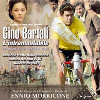Movie Wave Home | Reviews by Title | Reviews by Composer
GINO BARTALI, L'INTRAMONTABILE
Beautiful score from Morricone's latest trip back to WWII
A review by JAMES SOUTHALL
Music composed by
ENNIO MORRICONE
Rating
* * * *

Performed
by
ROMA SINFONIETTA
conducted by
ENNIO MORRICONE
Harmonica
GIANLUCA LETTERA
Viola
FAUSTO ANZELMO
Bass Guitar
NANNI CIVITENGA
Orchestration
ENNIO MORRICONE
Engineered by
FABIO VENTURI
Produced by
ENNIO MORRICONE
Album running time
48:37
Released by
RAI TRADE
Catalog number
FRT 416
Album cover copyright (c) 2006 Rai Trade; review copyright (c) 2006 James Southall
I'm not sure whether it's by accident or design, but Ennio Morricone's output lately has been almost exclusively associated with films about the Second World War. With Fateless, Senso 45, Il Cuore nel Pozzo, Cefalonia and lord knows how many others having come in the last couple of years alone, the latest is Gino Bartali, L'Intramontabile - but this one is a little different. The film is about Gino Bartali, a legendary Italian cyclist - whom it was recently discovered was involved with the Italian Resistance during the war, helping to get Italian Jews out of harm's way, knowing that the authorities wouldn't dare arrest him because of his fame. It sounds like it's a fascinating film, but like virtually everything else scored by Morricone these days, I don't suppose viewers outside Italy will ever see it.
The score veers between extremes. It opens with the extremely melancholy, tuneful - almost, dare I say, inspidly so - "Scalata alla Gloria", where the playful melody is carried by harmonica. It's nice, but perhaps veers slightly towards naff Euro-pop for comfort (I didn't think I'd ever be saying that about a Morricone score set during World War Two!) Contrast this with the second piece, the classically beautiful "Matrimonio d'Amore", the latest in a long list (currently standing at 1,494,662) of extraordinary Morricone love themes. Strings, piano and viola carry the piece which is sometimes vaguely reminiscent of The Legend of 1900. The idea is extended a bit in "I Suoi Amici", though here Morricone is in particularly wistful mode. "In Visita al Papa" introduces a simply outstanding duet between violin and viola which ought to be enough to melt any heart - it's Morricone at his very finest.
The score changes completely in "Togliatti", with martial music spotlighting very harsh percussion and brass which actually recalls The Battle of Algiers. It's typically-abrasive Morricone action music which won't be to everybody's tastes, but it really is quite brilliant. "Catturato" is more of the same, but then "Rivalita e Umorismo" reverts back to the opening theme, with a harmonica solo ushering in a slightly less corny version of it. The viola returns in "In Famiglia", for a reprise of the main love theme, before the score's most sweeping and outwardly gorgeous theme appears for the first time in "Fratello"; for me it is spoiled a little bit by the melodic line being taken over by an electric bass guitar towards the end, but otherwise it's perfect.
"I Babmini Salvatti" introduces suspense into the score for the first time, and it's typical Morricone suspense music, incomparably tense and effective but not particularly easy to listen to. "Minacce Sommesse" continues the suspense, but this time in a more melodic way, with a childlike, almost music box-style accompaniment provided by xylophone. "Nascoti e Soli" features particularly dissonant, angular string music which again makes for uncomfortable listening; but then the melodic splendour returns in "Prima del Giro", with the sweeping string melody blessed with almost rhapsodous accompaniment by piano. "Pedalare Stanca" brings forward more sorrow (though it's still achingly beautiful music) before the score closes with reprises of the opening two tracks (with electric guitar replacing harmonic carrying the main theme in the closing track).
This
is another fine effort from Morricone, who somehow seems to continue to
go from strength to strength and to be as prolific as ever despite his
now great age. Admittedly the main theme seems to be a bit cheap
in comparison with the rest of the score, but that's the only
complaint; Morricone fans should snap it up.
Tracks
- Scalata alla Gloria (4:31)
- Matrimonio d'Amore (2:16)
- I Suio Amici (1:47)
- In Visita Al Papa (3:49)
- Togliatti (2:12)
- Catturato (2:11)
- Rivalita e Umorismo (4:44)
- In Famiglia (2:17)
- Fratello (3:04)
- I Bambini Salvati (2:04)
- Minacce Sommesse (3:40)
- Nascosti e Soli (3:29)
- Prima del Giro (3:01)
- Pedalare Stanca (2:43)
- Matrimonio d'Amore (2:170
- Scalata alla Gloria (4:31)